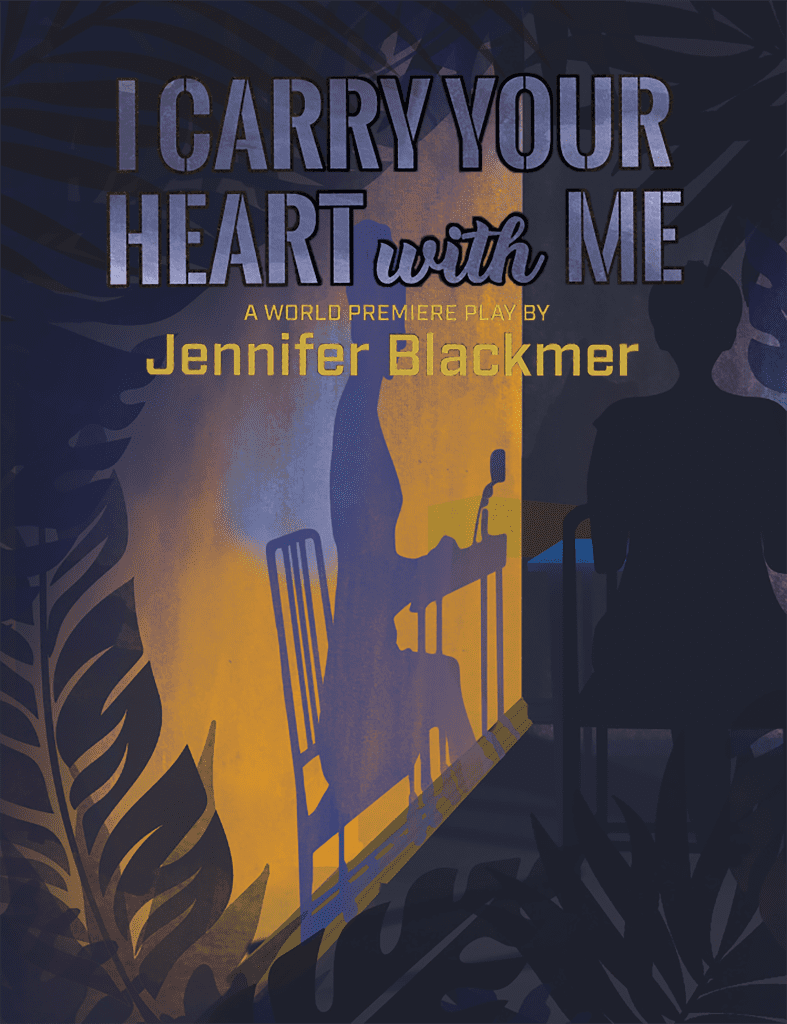“If I had to choose between betraying my country and betraying my friend, I hope I should have the guts to betray my country.”
– E.M. Forster, “What I Believe” (1938)


In a world where we’re all urged to find and live “our truth,” and where fiction is increasingly indistinguishable from fact, how do we ever know what “really” happened? And how do we shape a collective story about the history of who we are as a community and a country?
You might imagine that a transcription of a hearing or trial would be a good place to start; it’s hard to fight with a stenographic record of who said what, laid down in black and white.
But as playwright Jennifer Blackmer demonstrates in I Carry Your Heart With Me – which will debut next week as Third Avenue PlayWorks’ entry in the World Premiere Wisconsin festival – you’d be wrong.
Inspired by her mother’s stint as a young stenographer at Wright-Patterson Air Force Base, Blackmer’s one-actor play unspools a middle-aged Esther’s memories of a similar gig at Wright-Patterson during the Vietnam War. As with Blackmer’s mother, Esther’s top-security clearance places her in the debriefing room as returning non-coms describe what they’ve experienced.
“I’ve always been interested in my mom’s job as a young woman,” Blackmer said to me when we spoke recently by phone. “She never went into gritty detail with me about what she did, and then she passed away at 63, going pretty quick. There were things I thought we’d talk about as she got older, but I never got the chance. I wish I’d asked before it was too late.”
Now with grown kids of her own, Blackmer has instead done the next best thing: imagined the conversations she never had, as Esther recounts her time at Wright-Patterson to a daughter we never meet. With TAP Artistic Director Jacob Janssen at the helm, Karen Estrada will bring Esther to life and tell her story.
Whose Story? What Truth?
One of the first things Esther tells her daughter and us, at the very top of the play?
Every story is suspect, and the more we tell them the more they’re apt to be reshaped and restructured as we “wrestle them into submission when all they really want to do is remind us that nothing is ever certain.”
Even for a stenographer, whose ostensible function is as a human recorder.
As Esther explains, every stenographer has a “private language” – unique ways of translating spoken syllables. They also notice and record different things, such as the sounds – “the cries and moans and tears and gasps and sighs” – that Esther dutifully records and which are invariably scrubbed by one of the two military officers vetting her scripts before they’re made official.
What’s more, the noncom testimony that Esther transcribes is itself necessarily partial – a “broken mirror, still reflective but still shattered,” assembled from “shards of remembered events.”
The bottom line: All of us are looking through a glass darkly, all the time.
No wonder Blackmer’s play calls for just one actor; that structure underscores the fundamental alienation we all feel, isolated as we are by separate stories underscoring that we’re divided and alone – even when the actor embodying this story is as gifted and as warm as Estrada reliably is.
Given this context, how can we possibly connect, to share a story in which we can each believe?


Love Is Love Is Love
Listening to returning soldiers describe what they’ve been through, Esther finds her path forward through empathy, which clashes with her official duties and complicates her love life, in ways I Carry Your Heart With Me gradually reveals.
Blackmer suggests that empathy can similarly help us move forward, by enabling us to listen better to what others are trying to say.
“When we come together and share stories, we can learn to accept truths that are different from our own and that we don’t necessarily agree with,” Blackmer said. “And we can also forge connections which allow us to agree on certain truths – a common story of what happened.
“There are actual facts, and there are things that actually happen in the world,” Blackmer continued. “Stories are born when human beings come into contact with those facts. Connections and community occur when we learn to share those stories. It’s all about the connection. That’s where the real beauty lies.”
Cue the music for E.M. Forster; Esther invokes Forster’s Howards End (1910) on multiple occasions and names her daughter after one of that novel’s characters, who is as passionate and idealistic as young Esther herself.
“It’s a book I love, and Forster is a writer I love,” Blackmer said.
“I remember reading Howards End for the first time and experiencing a yearning for something different and better in my life. Forster offers us a sense of how we might coexist. He inspires me because of his commitment to empathy and compromise. He wills a person to step outside their insular space.”
Like Blackmer’s Esther, Forster also doesn’t shy away from how “muddled” – to use one of Forster’s favorite words – that process could be; compromise always is.
Howards End is a remarkable book that forever stays with you, for many reasons. One of them is Forster’s honesty about how hard it can be to make connections, given our many differences. But in Howards End as in all of his novels, Forster nevertheless insists that we try, which makes his century-old novel as relevant as ever.
“Every time I look at the news I am astounded by the lack of empathy,” Blackmer said, even as she admitted that “empathy is hard.”
“It requires effort and a genuine desire to really do and make the world a better place,” Blackmer added, conveying some of that yearning she’d experienced in first reading Forster – or that you yourself are likely to experience as you watch Estrada channel Esther while trying to connect with her audience.
“People want to practice empathy,” Blackmer insisted, “even though they don’t know how. But their desire gives me hope. It’s the same sort of hope that brings us to the theater in the first place. I hope people emerge from the theater after seeing this play with an urge to connect or reconnect with someone important to them.”


Third Avenue PlayWorks’ production of I Carry Your Heart With Me runs from May 10-28 at Third Avenue PlayWorks, 235 N. 3rd Ave., Sturgeon Bay. Learn more by visiting https://worldpremierewisconsin.com/event/i-carry-your-heart-with-me-3/.



